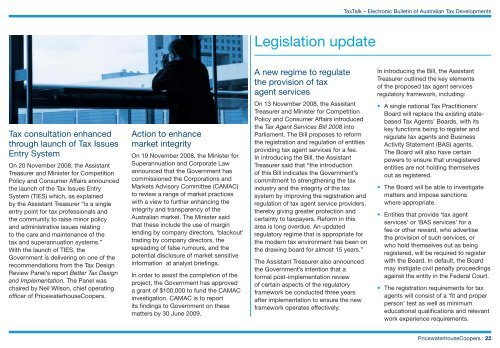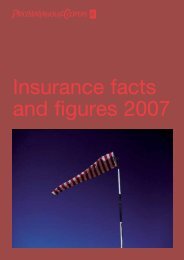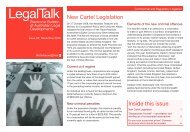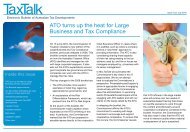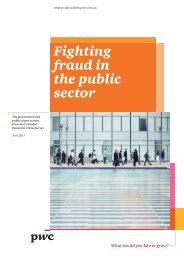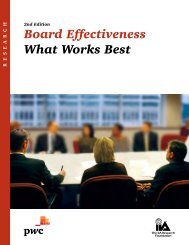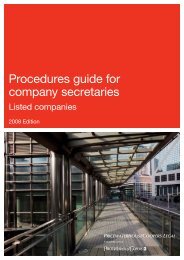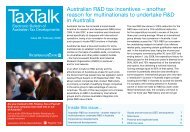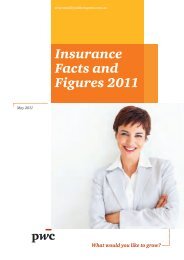Thin capitalisation: eroding asset values and increasing debt ... - PwC
Thin capitalisation: eroding asset values and increasing debt ... - PwC
Thin capitalisation: eroding asset values and increasing debt ... - PwC
Create successful ePaper yourself
Turn your PDF publications into a flip-book with our unique Google optimized e-Paper software.
TaxTalk – Electronic Bulletin of Australian Tax Developments<br />
Legislation update<br />
Tax consultation enhanced<br />
through launch of Tax Issues<br />
Entry System<br />
On 20 November 2008, the Assistant<br />
Treasurer <strong>and</strong> Minister for Competition<br />
Policy <strong>and</strong> Consumer Affairs announced<br />
the launch of the Tax Issues Entry<br />
System (TIES) which, as explained<br />
by the Assistant Treasurer “is a single<br />
entry point for tax professionals <strong>and</strong><br />
the community to raise minor policy<br />
<strong>and</strong> administrative issues relating<br />
to the care <strong>and</strong> maintenance of the<br />
tax <strong>and</strong> superannuation systems.”<br />
With the launch of TIES, the<br />
Government is delivering on one of the<br />
recommendations from the Tax Design<br />
Review Panel’s report Better Tax Design<br />
<strong>and</strong> Implementation. The Panel was<br />
chaired by Neil Wilson, chief operating<br />
officer of PricewaterhouseCoopers.<br />
Action to enhance<br />
market integrity<br />
On 19 November 2008, the Minister for<br />
Superannuation <strong>and</strong> Corporate Law<br />
announced that the Government has<br />
commissioned the Corporations <strong>and</strong><br />
Markets Advisory Committee (CAMAC)<br />
to review a range of market practices<br />
with a view to further enhancing the<br />
integrity <strong>and</strong> transparency of the<br />
Australian market. The Minister said<br />
that these include the use of margin<br />
lending by company directors, ‘blackout’<br />
trading by company directors, the<br />
spreading of false rumours, <strong>and</strong> the<br />
potential disclosure of market sensitive<br />
information at analyst briefings.<br />
In order to assist the completion of the<br />
project, the Government has approved<br />
a grant of $100,000 to fund the CAMAC<br />
investigation. CAMAC is to report<br />
its findings to Government on these<br />
matters by 30 June 2009.<br />
A new regime to regulate<br />
the provision of tax<br />
agent services<br />
On 13 November 2008, the Assistant<br />
Treasurer <strong>and</strong> Minister for Competition<br />
Policy <strong>and</strong> Consumer Affairs introduced<br />
the Tax Agent Services Bill 2008 into<br />
Parliament. The Bill proposes to reform<br />
the registration <strong>and</strong> regulation of entities<br />
providing tax agent services for a fee.<br />
In introducing the Bill, the Assistant<br />
Treasurer said that “the introduction<br />
of this Bill indicates the Government’s<br />
commitment to strengthening the tax<br />
industry <strong>and</strong> the integrity of the tax<br />
system by improving the registration <strong>and</strong><br />
regulation of tax agent service providers,<br />
thereby giving greater protection <strong>and</strong><br />
certainty to taxpayers. Reform in this<br />
area is long overdue. An updated<br />
regulatory regime that is appropriate for<br />
the modern tax environment has been on<br />
the drawing board for almost 15 years.”<br />
The Assistant Treasurer also announced<br />
the Government’s intention that a<br />
formal post-implementation review<br />
of certain aspects of the regulatory<br />
framework be conducted three years<br />
after implementation to ensure the new<br />
framework operates effectively.<br />
In introducing the Bill, the Assistant<br />
Treasurer outlined the key elements<br />
of the proposed tax agent services<br />
regulatory framework, including:<br />
• A single national Tax Practitioners’<br />
Board will replace the existing statebased<br />
Tax Agents’ Boards, with its<br />
key functions being to register <strong>and</strong><br />
regulate tax agents <strong>and</strong> Business<br />
Activity Statement (BAS) agents.<br />
The Board will also have certain<br />
powers to ensure that unregistered<br />
entities are not holding themselves<br />
out as registered.<br />
• The Board will be able to investigate<br />
matters <strong>and</strong> impose sanctions<br />
where appropriate.<br />
• Entities that provide ‘tax agent<br />
services’ or ‘BAS services’ for a<br />
fee or other reward, who advertise<br />
the provision of such services, or<br />
who hold themselves out as being<br />
registered, will be required to register<br />
with the Board. In default, the Board<br />
may instigate civil penalty proceedings<br />
against the entity in the Federal Court.<br />
• The registration requirements for tax<br />
agents will consist of a ‘fit <strong>and</strong> proper<br />
person’ test as well as minimum<br />
educational qualifications <strong>and</strong> relevant<br />
work experience requirements.<br />
PricewaterhouseCoopers : 22


